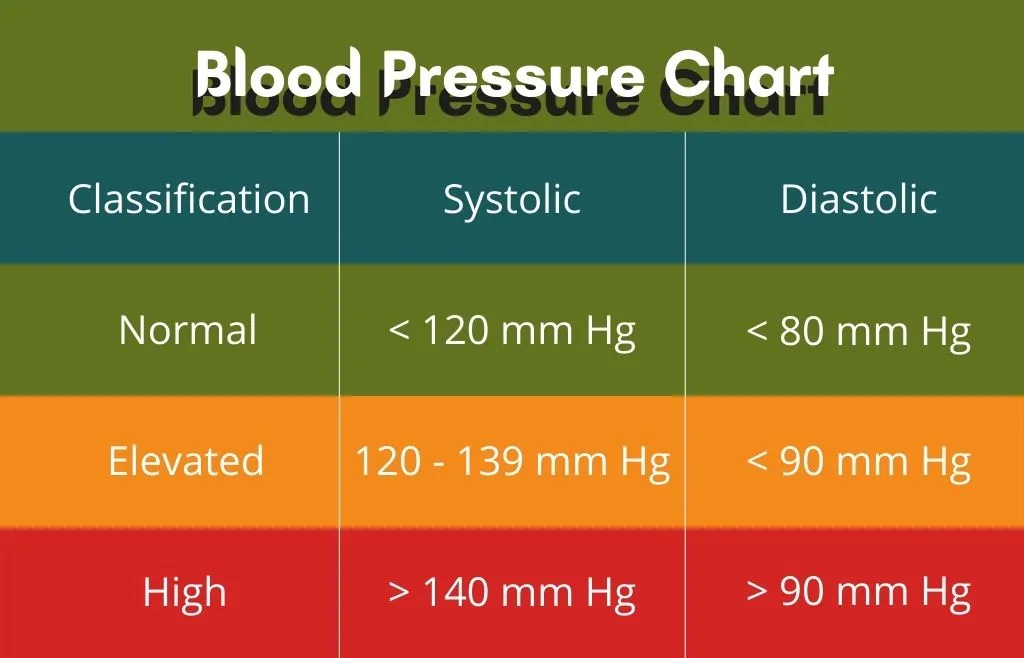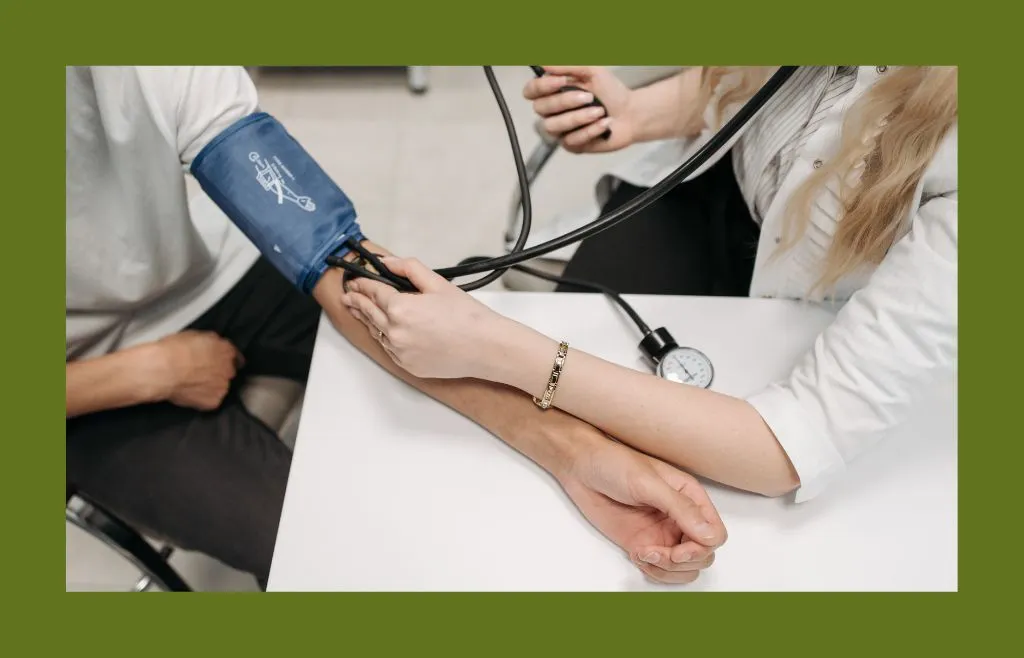Blood pressure is a measure of the force that your heart uses to pump blood around body. It’s important to know what makes up high blood pressure and what causes it so you can lower the risk of developing hypertension later in life.
Definition of Blood pressure
Blood Pressure Definition–Blood pressure is an indicator of the force exerted on your arteries as blood flows through them. The higher the BP, the harder your arteries work to keep the blood flowing smoothly.
Two numbers describe blood pressure. BP is measured by taking the top number (systolic) and the bottom number (diastolic). The average person has a systolic blood pressure of 120 mm/Hg and a diastolic blood pressure of 80 mm/Hg.
Symptoms of Blood pressure
The force exerted by blood calculates blood pressure pushing against the walls of the arteries. Your heart pumps out oxygenated blood through the system every time you breathe. When you’re resting, BP stays low because there isn’t much pressure inside the blood vessels. But when you exercise, the bloodstream gets crowded with blood cells, and the extra pressure causes arteries to expand.
That extra squeeze can cause damage if it happens quickly enough to disrupt regular blood flow. If something stops your blood from flowing normally, blood pressure spikes. This means your blood vessels get stiffer and harder to push open. If your heart beats fast enough, your blood pressure could rise even higher. High BP often occurs during an acute episode of illness, like a flu. Symptoms may include headaches, dizziness, fatigue, chest pain, blurred vision, rapid heartbeat, shortness of breath, and fainting. It also known hypertension as high BP.
Blood Pressure Type
High BP, normal BP, low BP, etc.
Blood pressure range

What causes blood pressure?
When we think about blood pressure, our mind goes to heart disease. But what happens inside the body, in veins and arteries, differs from what we see. Heart disease does not cause high BP at all. BP stems from problems in the small muscles around brain and eyes called the arterial walls. These arterial walls expand and contract with each heartbeat, and because the movement of these walls is slow relative to the speed of the heart, the artery becomes stiffer during times of low blood flow. A stiffened artery creates higher blood pressure.
What precautions to take in BP?
There are several ways you can treat high blood pressure. One method is medication, while another is lifestyle changes, like not smoking or drinking alcohol, eating well, exercising regularly, etc. If those measures aren’t enough, your doctor may recommend surgery.
What precautions should you take while pregnant?
How your body changes during pregnancy will affect the health and well-being, including the heart, lungs, kidneys, liver, bones, muscles, skin, brain, eyes, ears, nose, throat, stomach, intestines, genitalia, breasts, bladder, sexual organs, womb, cervix, fetus, placenta, umbilical cord, amniotic fluid, hair, nails, sweat glands, tears, saliva, breast milk, colostrum, semen, urine, feces, vaginal secretions, menses, menstrual period, menstruation, delivery, labor pain, birth canal, newborn, lactation, postpartum recovery, menopause, childbirth, miscarriage, abortion, ovulation, pregnancy symptoms, and fertility.
Effect on kidneys due to BP
Kidney damage can lead to kidney failure if not treated soon. A patient may need dialysis to remove waste products from their bloodstream that have built up because of high BP. Kidneys fail when damaged tissue cannot produce enough urine (urine production) or when excess fluid collects in the body (edema), causing swelling. Blood vessels may also become blocked, leading to an increased risk of heart attack or stroke. If left untreated, chronic kidney disease results in serious health problems such as cardiovascular diseases, bone disorders, mental illness, and decreased quality of life.
What kind of food to adopt in BP?
It is important to adopt healthy foods in situation of blood pressure. Foods that are rich in potassium help lower blood pressure. Potassium helps nerves work properly, and when you have enough potassium in the body, you have a steady heartbeat. Vegetables like bananas, spinach, and tomatoes help lower BP. the other foods that help lower BP include almonds, beans, carrots, celery, garlic, orange juice, peppers, potatoes, and salmon.
Blood pressure monitoring machine
A blood pressure monitor measures BP and stores information inputs in a database. These devices may also provide other health statistics like pulse rate. BP monitors are useful for monitoring patients at home or while traveling. However, you shouldn’t place them near a stove or any source of heat because they become extremely hot.

Yogasana for blood pressure
For thousands of years, we have practiced yoga in India. It focuses on physical and mental health through various techniques, like breathing exercises, meditation, relaxation, exercise, and concentration. Yoga helps reduce stress and improves the overall quality of life.
FAQ
What is the Cause of High BP?
Blood pressure is the force exerted by blood against artery walls when the heart beats. When the force exceeds the strength of the wall, the wall will stretch. If enough stretching occurs, the vessel may rupture or collapse. BP causes damage to all organs directly connected to arteries, including the brain, eyes, kidneys, intestines, and skin. These injuries are called hypertensive vascular disease.
What are Diastolic and Systolic Blood Pressure?
“When your heart beats, it pushes out blood through your body. After it pushes out all the blood, it goes back inside again and fills itself up. When it is empty, it sends another pulse out to push out blood.”
This is called diastolic blood pressure. Your systolic BP measures how hard your heart beats. You measure your systolic blood pressure when you feel your heartbeat through your arm. If you are resting, your systolic BP should be around 120 mm Hg. If you are exercising or doing something that raises your BP, your systolic reading may go up to 140 mm Hg. That means your heart is beating harder and pushing more blood out each time it pumps.
What Is a Normal BP?
Normal blood pressure means your BP isn’t high enough to put you at risk for heart disease.
What Health Problems Can Arise With High BP?
High blood pressure can damage your heart, brain, eyes, kidneys, and other organs. But what exactly happens when BP gets high? And what steps should you take if you think you might have high BP? Read about BP levels and signs of hypertension here.
How Do I Know If I Have High BP?
High blood pressure, also called hypertension, is a very serious condition that requires prompt medical attention. Hypertension causes thickening and hardening of the arteries. As a result, the heart needs to pump harder to deliver enough oxygen throughout the body. Hypertension is classified according to the level of force with which the blood flows through the vessels. When the flow is low, the BP is considered normal. However, when the BP rises above 140/90, then it is considered high. People often mistake fatigue and stress as signs of high blood pressure. However, high BP may also occur even if you feel fine. There are several ways to determine whether or not your blood pressure is high. If you have any questions about your health, ask your health care provider immediately.
How to get rid of High BP?
There are many ways you can lower your BP, including losing weight if you’re overweight, eating less salt, and staying active. If you think you might have high BP, talk with your doctor about what steps you should take to manage it.
What Are the Adverse Effects of High BP Drugs?
High blood pressure drugs are highly effective at lowering BP. But there is a small chance that you could experience side effects while taking them. These side effects may include fatigue, nausea, vomiting, diarrhea, headache, dizziness, abdominal pain, constipation, dry mouth, back pain, flushing, tingling, itching, numbness, weakness, shortness of breath, confusion, depression, anxiety, blurred vision, memory loss, weight gain, kidney problems, liver problems, muscle cramps, stomach ulcers, heartburn, chest pains, irregular heartbeat, high cholesterol, heart attack, stroke, blood clotting, sudden death, and cancer.
What kind of Diet to Follow if I Have High Blood Pressure?
more fruits, vegetables, and low-fat dairy foods may help
Avoid food that is high in saturated fat and cholesterol, such as fried foods
Eat more whole grain products, fish, poultry, and nuts
Eat magnesium, potassium, and calcium-rich food
Have a diet with less sodium
When to call Doctor for High BP?
Sometimes you need a doctor, and sometimes a pharmacist can help you out. For high blood pressure, there are two main categories of drugs: those meant to lower your blood pressure and those meant to raise your blood pressure. If you’re taking medication meant to lower your blood pressure, make sure you talk with your doctor before changing them. When you’re just starting on drug therapy, it can take time for your body to adjust to any changes in dosage or type of drug. Your doctor will likely give you an initial dose, followed by smaller adjustments if necessary. If you’ve tried everything else and nothing seems to work, it may be time to consult a specialist.
Can Drugs Cause High BP?
In modern society, there are many drugs that we take every day to help us feel better or deal with our problems. Some of these medicines can cause high blood pressure.

